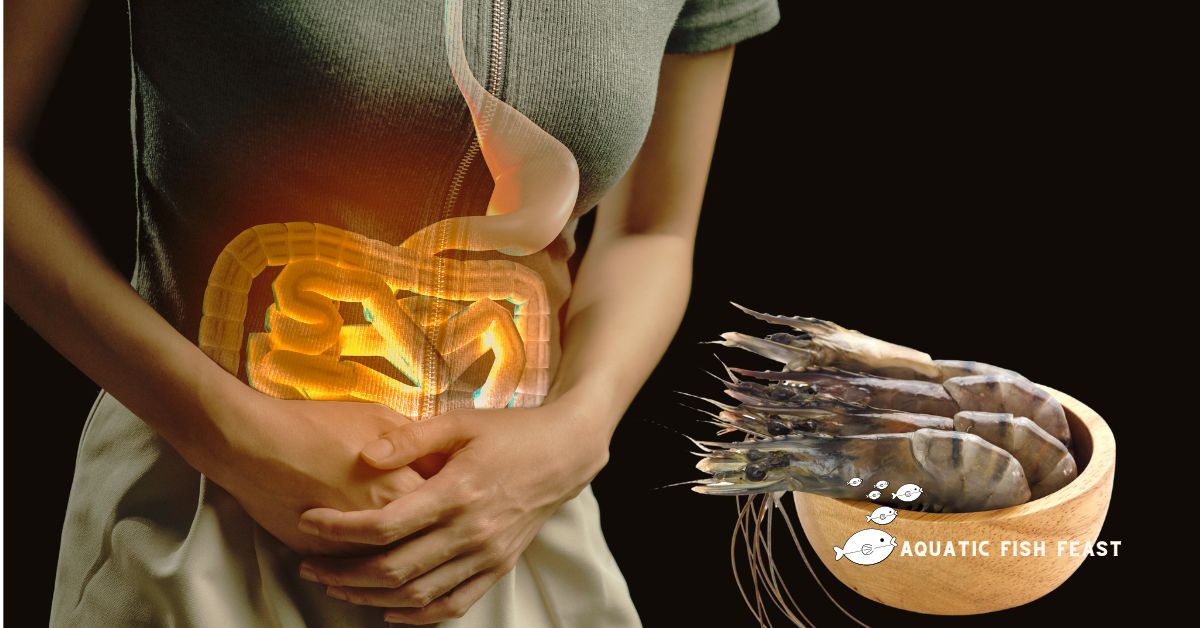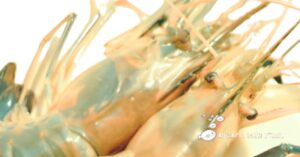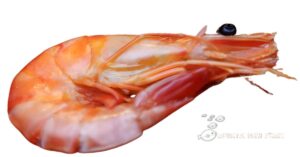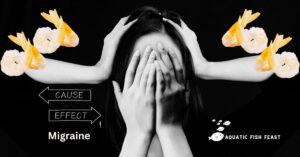Do you want to know if prawns can give you diarrhea? Yes, prawns can give some people diarrhea. Based on what I have known for years and still counting.
Prawns can also cause foodborne disease if they are not properly cooked well and taking care of.
Other issues with prawns is that they can cause gastrointestinal symptoms, such as abdominal cramps and vomiting when they are affected with bacteria and parasites.
You can tell from these symptoms if someone got food poisoning from eating lousy prawns in several ways.
Later in this article, you will also learn simple tips on how to reduce the risk of getting diarrhea from prawns.
Now, let’s get started.
Read Also: Can You Eat Prawns The Next Day?
Table of Contents
Can Prawns Give You Diarrhea
Yes, prawns can cause diarrhea in some people. There are many reasons why this can happen. Such as Prawns Contamination with Bacteria, Those that allergies, and when prawns are not properly handle correctely.
Reasons why prawns can cause diarrhea
1. Prawns Contamination
When prawns are contaminated, it can cause diarrhea. Researchers suggest bacteria that easily affect prawns include:
- Vibrio vulnificus
- Vibrio parahaemolyticus
- Salmonella
This bacteria can easily induce diarrhea in patients with compromised immune systems. Especially those affected by liver illness, cancer, or HIV/AIDS more easily.
2. Allergies
Some people are naturally allergic to shellfish; if you are in this category, I advise you to avoid eating prawns.
Symptoms of a prawn allergy:
- Diarrhea
- Vomiting
- Hives
- Breathing difficulty.
3. Not Properly Handling Prawns and Cooked
Prawns can also cause diarrhea if they are not protected and cooked properly. This point is key to handling prawns, from harvesting them to storage.
Poorly preserved prawns can harbor germs that grow after cooking and cause diarrhea.
Careful preservation will help prevent bacterial contamination in our prawns.
How To Eliminate The Risk Of Prawns Diarrhea
To eliminate the risk of getting diarrhea from eating prawns, it is important to follow the proper food-cooking process and handling of things.
Here are some straightforward tips:
1. Source your prawns wisely
You can buy prawns from a regional seafood market or grocery store known for selling fresh, healthy seafood.
2. Properly store prawns
Proper storage is an important rule to help prevent bacterial growth in prawns when they are not ready to use after purchase.
Put them in storage bags and keep them inside a refrigerator with a temperature below 40°F (4°C). When kept in the refrigerator, except in the freezer, this should be stored for longer than 3 days.
3. Cook prawns thoroughly
When you buy fresh prawns to avoid diarrhea, it is expected that you clean them properly with water and cook them thoroughly by heating them until they turn opaque at about 145°F (63°C).
4. Prevent cross-contamination
When handling raw prawns, a very simple way to prevent contamination is to use separate utensils, cutting boards, and surfaces.
5. Practice good hygiene
My final note here is to always wash your hands well before and after handling raw prawns and seafood to prevent the spread of bacteria.
How To Differentiate Between Allergic And Other Cause of Diarrhea
Due to common symptoms, allergic responses and other causes of diarrhea might be difficult to differentiate. However, certain vital factors can help you distinguish the two.
1. Timing can immediately differentiate allergic responses from other causes of diarrhea. Allergic reactions usually start 20 minutes or more hours after eating trigger food.
When you develop diarrhea immediately after eating prawns, you may have an allergic response. On the other hand, diarrhea cause by bacterial takes longer time to react.
2. Severity can help differentiate allergic diarrhea from other causes. Allergic reactions often cause severe symptoms such as fast breathing, swelling of the face, lips, tongue, and a fast pulse.
When these symptoms follow up by diarrhea, it is a sign of an allergy is reaction. Other cause of diarrhea do not result to such symptoms.
3. Allergic reactions can also involve hives, itching, and swelling. And when they cause diarrhea, it is likely an allergic response.And other diarrhea causes don’t.
4. Your medical background helps you distinguish these conditions: Having a history of food allergies or other allergic responses increases the probability of allergic diarrhea.
5. Physical examination is sometimes the best approach to diagnose prawn-related symptoms. A fast physical exam can detect allergic reactions such as hives, swelling, and breathing problems.
Blood or skin prick tests may be needed to confirm allergies. If the reason for diarrhea is unknown, they may advise against certain foods.
What Is Diarrhea
When you lose and have watery stools more frequently than regular bowel, it is called diarrhea.
Whenever you have diarrhea, it means your large intestine has less time to absorb the water in your stool because the transit period—the length of time food takes to pass through your body—is shortened.
During digestion, food passes through your small and large intestines in normal digestion, and the large intestine absorbs most of the water.
When you have diarrhea for more than 3 days, that’s called chronic diarrhea.
Here are diarrhea symptoms caused by prawns include the following:
Watery, loose stools that happen at least several times a day
- stomach aches or cramps
- Swelling
- Emesis
- Hurling
- High temperature
- In your stool, blood
- In your stool, mucus
- The urgent necessity to go to the bathroom
Why Does Seafood Boil Like Prawn Give Me Diarrhea
Prawn boil is a favorite meal with many people. However, on the other hand, among the potential negative consequences is diarrhea.
This can happen because prawn boilers have lots of shellfish, several of which could have been infected with parasitic bacteria that can cause digestive problems.
In addition, raw prawns can be easily affected by microbes that may lead to illnesses linked to food.
Plus, incorrect seafood refrigeration can lead to food poisoning and diarrhea, too.
Therefore, it’s crucial to get medical help if you have diarrhea after consuming prawn boil.
The most prevalent toxin present in seafood is thallium. There is a recognized risk of paralytic food poisoning from shellfish.
About an hour after eating, some symptoms that may manifest are tingling, numbness, and paralysis. Food scraps gathered on the walls between the kitchen floor tiles and the prep area for cooked items.
Eating shellfish that contain toxins such as trivalent and tricyclic lactones, such as mussels, cockles, scallops, oysters, and whelks, can result in shellfish poisoning.
You could thus experience gastrointestinal symptoms, including watery diarrhea, which, if left untreated, might be fatal.
The indigestible oil in oil fish and escolar can cause esophagogastropies because it builds up in the rectum before discharge.
Diarrhea can range from a yellow or greasy discharge to severe diarrhea caused by shellfish poisoning, which may include nausea and vomiting.
You should get help as soon as possible if any of these symptoms appear after consuming shellfish.
What Are Other Dangers Of Eating Spoiled Prawns
The most popular shellfish in recipes is prawns, and rotten shellfish poisoning, which can induce vomiting and diarrhea, is one of the most frequent forms of food poisoning.
No matter how delicious and mouthwatering a dish of prawns may seem, every fan of shellfish occasionally encounters a nasty prawn.
One rotten prawn might cause your stomach to revolt and try to get rid of the meal.
This explains why you will feel groans and cramps that last for days and cause you to feel weak and exhausted.
The pleasure appears to outweigh the hazards, even if you may subsequently swear never to eat anything born in the water.
Additionally, seafood serves as millions of people’s natural protein and mineral source.
Giving up seafood might leave kids without vital minerals if it’s a staple in their diet.
However, this does not imply that the health hazards are unimportant.
If an excessive amount of rotten prawn is swallowed, your condition can become lethal.
A little bacteria found in prawns must be eradicated by boiling them properly.
Furthermore, germs and parasites build up in the raw crustacean if kept unsupervised, which might result in contamination.
While cooked prawns are kept in the refrigerator for 3–4 days, dyspepsia might still be a concern even if good cooking removes the germs from the prawns.
The only thing you can do is throw them in the garbage after that.
What Are The Benefits Of Eating Prawns
Eight ounces of seafood low in mercury should be consumed each week, according to the Dietary Guidelines for Americans.
Seafood contains a poison called mercury, which, when ingested in large enough quantities, can damage the neurological system and cause symptoms including paralysis of the muscles or loss of peripheral vision.
Prawns are considered seafood with health advantages, mainly because they are low in mercury.
1. It might lower the chance of getting heart disease.
Fish consumption is likely associated with a reduced risk of cardiac disease, including heart attacks, if the fish is not seared (frying fish increases the chance).
According to one review of National Health and Nutrition Examination Survey data, shows that those who ate prawns had a lower risk of high blood pressure and high cholesterol as well as a reduced risk of heart disease and stroke than people who did not eat prawns.
2. Could Lead to Better Pregnancy Results
Women who eat more of seafood during pregnancy have children with more significant cognitive development than those who consume none.
Can Prawns Cause Diarrhea In Dogs
I have noticed all this while that you can give them small amounts of prawns that have been properly prepared and cooked and are good for canines and pups to consume.
Both cholesterol and salt are found in relatively high concentrations in prawns.
However, ensure that prawns are cooked through, and also do remember to remove the shell, veins, and tail before serving them.
The shells pose a risk of choking and are not very good in the intestines if swallowed.
Also, germs in prawns can cause shellfish poisoning in your dog if the prawns are not cooked thoroughly.
Read Also: Can Fish Food Cause Algae?
Final Thought
Now that we have established that prawns can give you diarrhea, it should be known that diarrhea usually subsides in a few days and can be treated with over-the-counter medications and a bland diet.
Take enough water to remain hydrated, and try to see your doctor if symptoms persist for more than 3 days.
Here are some credible sources and studies that support the information presented in the article:
- “The Effects of Prawn Consumption on Human Health” by the Food and the Agriculture Organization of the United Nations (FAO)
- “Prawns and Shrimps: A Review of Their Nutritional and Health Benefits” by the Journal of Food Science and Technology
- “Prawns and Shrimps: A Review of Their Nutritional and Health Benefits” by the Journal of Food Science and Technology
- “The Nutritional Value of Prawns” by the Australian Prawn Farmers Association
- “Prawns and Shrimps: A Review of Their Nutritional and Health Benefits” by the Journal of Food Science and Technology
- “The Role of Prawns in the Diet” by the Journal of Nutrition and Dietetics
- “Prawns and Shrimps: A Review of Their Nutritional and Health Benefits” by the Journal of Food Science and Technology
- “The Safety of Prawns” by the Food Standards Agency
- “Prawns and Shrimps: A Review of Their Nutritional and Health Benefits” by the Journal of Food Science and Technology




